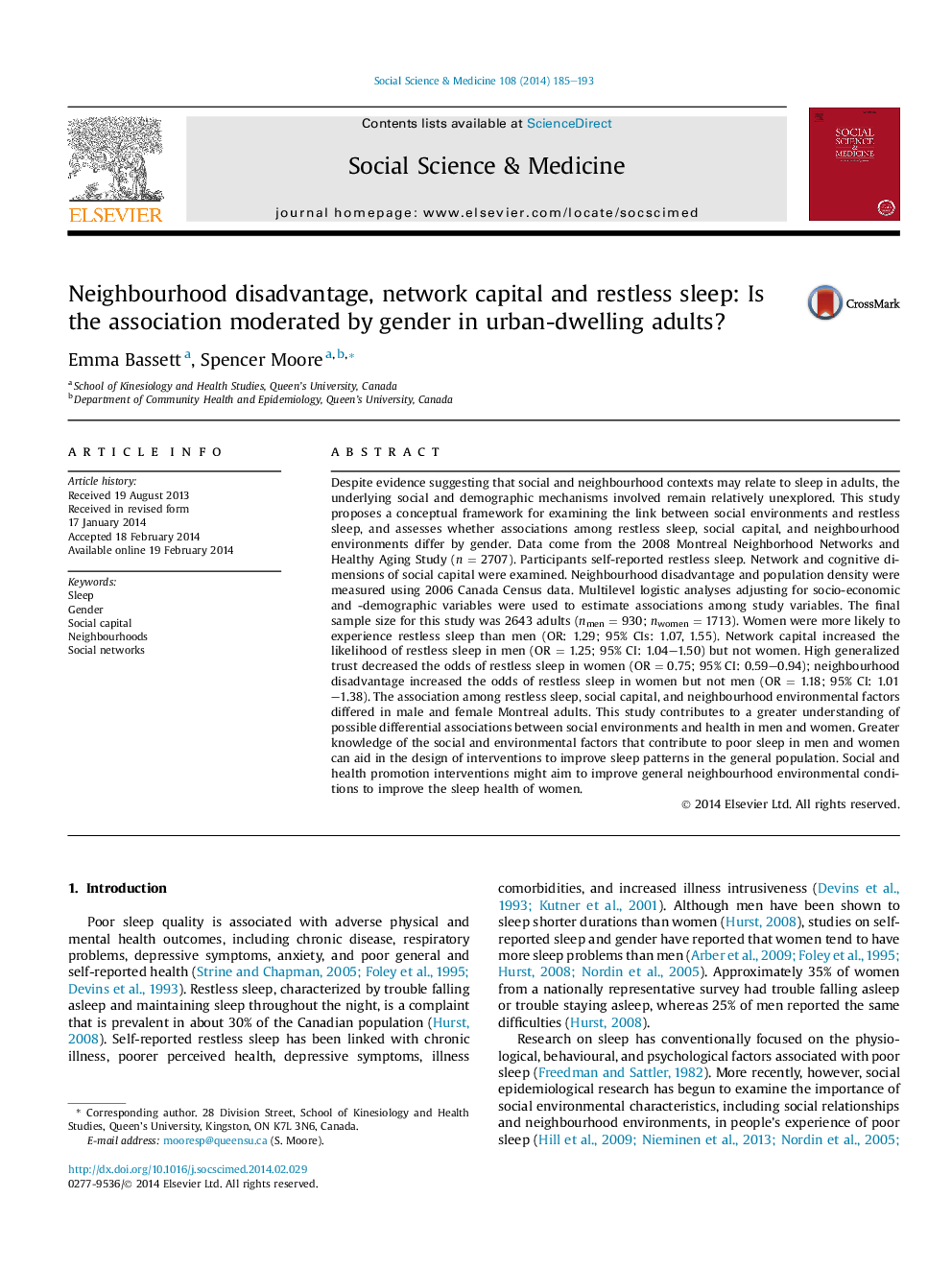| کد مقاله | کد نشریه | سال انتشار | مقاله انگلیسی | نسخه تمام متن |
|---|---|---|---|---|
| 7335327 | 1476060 | 2014 | 9 صفحه PDF | دانلود رایگان |
عنوان انگلیسی مقاله ISI
Neighbourhood disadvantage, network capital and restless sleep: Is the association moderated by gender in urban-dwelling adults?
ترجمه فارسی عنوان
معایب همسایگی، سرمایه شبکه و خواب بی تحرک: آیا این انجمن به وسیله جنسیت در بزرگسالان شهری زندگی می کند؟
دانلود مقاله + سفارش ترجمه
دانلود مقاله ISI انگلیسی
رایگان برای ایرانیان
کلمات کلیدی
خواب جنسیت، سرمایه اجتماعی، محله ها، شبکه های اجتماعی،
موضوعات مرتبط
علوم پزشکی و سلامت
پزشکی و دندانپزشکی
سیاست های بهداشت و سلامت عمومی
چکیده انگلیسی
Despite evidence suggesting that social and neighbourhood contexts may relate to sleep in adults, the underlying social and demographic mechanisms involved remain relatively unexplored. This study proposes a conceptual framework for examining the link between social environments and restless sleep, and assesses whether associations among restless sleep, social capital, and neighbourhood environments differ by gender. Data come from the 2008 Montreal Neighborhood Networks and Healthy Aging Study (n = 2707). Participants self-reported restless sleep. Network and cognitive dimensions of social capital were examined. Neighbourhood disadvantage and population density were measured using 2006 Canada Census data. Multilevel logistic analyses adjusting for socio-economic and -demographic variables were used to estimate associations among study variables. The final sample size for this study was 2643 adults (nmen = 930; nwomen = 1713). Women were more likely to experience restless sleep than men (OR: 1.29; 95% CIs: 1.07, 1.55). Network capital increased the likelihood of restless sleep in men (OR = 1.25; 95% CI: 1.04-1.50) but not women. High generalized trust decreased the odds of restless sleep in women (OR = 0.75; 95% CI: 0.59-0.94); neighbourhood disadvantage increased the odds of restless sleep in women but not men (OR = 1.18; 95% CI: 1.01-1.38). The association among restless sleep, social capital, and neighbourhood environmental factors differed in male and female Montreal adults. This study contributes to a greater understanding of possible differential associations between social environments and health in men and women. Greater knowledge of the social and environmental factors that contribute to poor sleep in men and women can aid in the design of interventions to improve sleep patterns in the general population. Social and health promotion interventions might aim to improve general neighbourhood environmental conditions to improve the sleep health of women.
ناشر
Database: Elsevier - ScienceDirect (ساینس دایرکت)
Journal: Social Science & Medicine - Volume 108, May 2014, Pages 185-193
Journal: Social Science & Medicine - Volume 108, May 2014, Pages 185-193
نویسندگان
Emma Bassett, Spencer Moore,
